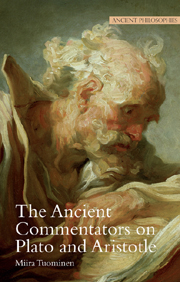1 - Introduction
Summary
A starting-point
What is a commentary?
What distinguishes a philosophical commentary from all other philosophical treatises? Can we pinpoint a set of presuppositions that characterize a commentary? In the colloquial sense, commenting refers to presenting opinions on or reacting to something, be it something scientific or artistic, written or spoken, advanced or ordinary. If this were all there was to commenting, it would be virtually impossible to find any philosophical works that are not commentaries. Thus philosophical commenting – or perhaps all commenting in texts – requires something more than making comments in ordinary speech. Yet some conceptual link remains between the two activities. At the least, in both cases it is vital that comments are presented about something: commenting has an object. However, this is not a sufficient criterion for identifying commentaries. In a sense, any reasonable philosophical activity is about something, whether the object is a literary product (a written or oral text) or reality.
A closer description of a commentary can be arrived at if we require that the object of a commentary be a text, written or oral. Let us call such a text “the object text” of a commentary. Commentaries in this sense can proceed more loosely if only parts of a text are commented on and others are not, and the commentary does not aim at anything like a complete coverage of the text. Such works can be distinguished from linear or formal commentaries, which follow the object text line by line and cover most of its contents.
- Type
- Chapter
- Information
- The Ancient Commentators of Plato and Aristotle , pp. 1 - 40Publisher: Acumen PublishingPrint publication year: 2009

